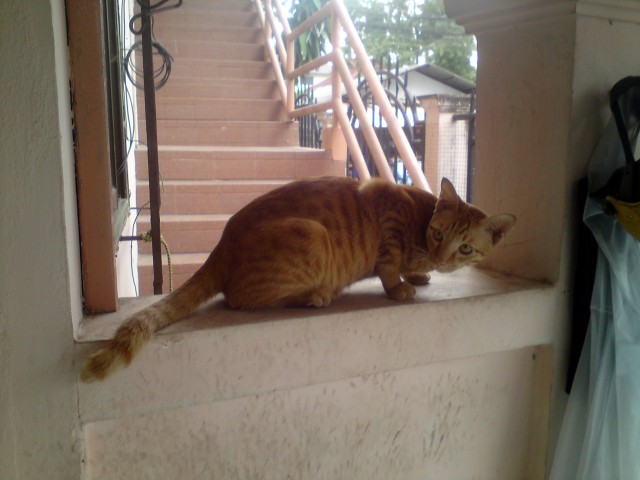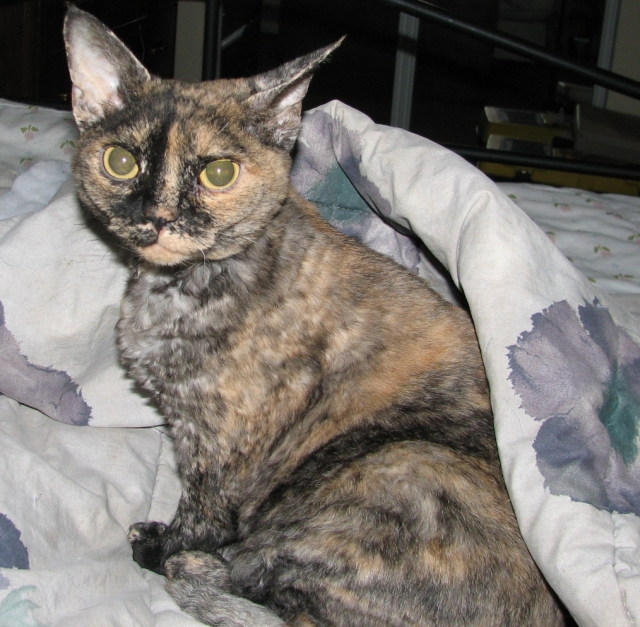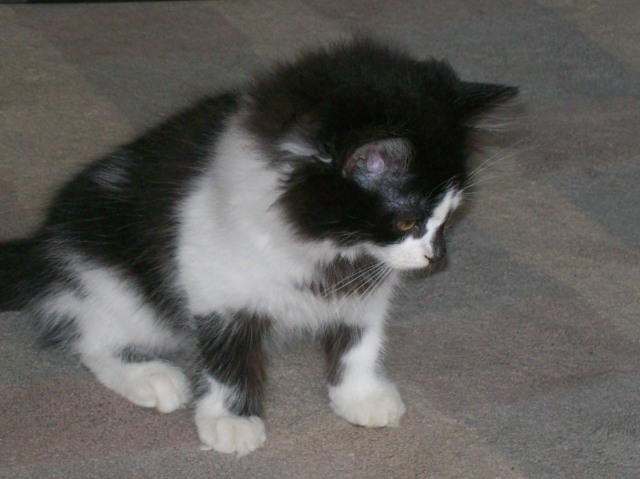QuestionHello Savannah, I have a 15 year old female cat that I have recently acuired.She is always scratching and grooming to the point that she takes out hair and breaking the skin.She apparently has always done this.I have tried to cover the places she was scratching with a coat, only to find that she just starts scratching in another place,including her eyes.I have also tried creams and shampoos and I know she does not have fleas.
I hope you can help i think it may be behavioral
Hope to hear from you soon
Maria.
AnswerMaria,
I just answered another question similar to yours. There can be several reasons your cat is scratching and grooming so much, so lets look at the most common.
If you're sure she doesn't have fleas, then that can be ruled out. How about mites or ringworm? Do you know if she could have these? Ringworm is a very common fungal infection that is common in shelter kitties (you stated you just acquired her, so not sure if you got her through a shelter or somewhere else). But even if you didn't get her through a shelter, ringworm is so common and so prevalent, that you can bring it in on your shoes, and spread it that way.
Ringworm is a fungus that grows in the soil. You can bring the spores into your home on your shoes, on your hands, on your clothes, on inanimate objects. If your cat rubs up against or gets close to these things, then she will likely get it.
It presents as a round patch of hair loss, but I've seen different presentations, although not as commonly or as often. Sometimes ringworm just presents as a cat scratching incessantly and biting with hair falling out (or maybe not). You can't see it, or feel it--you just see the symptoms of it. The only way to definitively dx it is to do a skin scraping. It will be placed into a growing medium, usually on an agar plate, and within 48 hrs, if it is ringworm, you will see the skin sample start reacting to the chemical reagents that have been added. Sometimes it can take longer to grow out--a wk or so. If after a wk there's no growth, then it's probably safe to say your cat doesn't have ringworm.
If it does have ringworm, there are certain meds you can give your cat, which also includes a dip called lime sulphur. This is the single most effective treatment for a cat with ringworm, but it smells like rotten eggs, so it's tough! But it's been found to be something like 94-98% effective in cats with ringworm. There are other treatments, some pills, some creams, some sprays, but they aren't as effective, and the pills can be toxic to a cat. The catch, though, to treating ringworm, is to either throw away all beds and blankets the cat has come in contact with, or thoroughly sanitize them in hot water and bleach. This includes your clothes, bedding, bathroom rugs, or other household rugs, etc. Ringworm is so highly contagious (to people too) because of the spores, and if you don't get rid of the spores, you will never get rid of it. So, ringworm is something you may want to consider.
Next would be an allergy to food or something in the environment. A common reason cats scratch and bite almost obsessively is an allergy to food, and the most common culprit is chicken or grain. I'd take a good look at the ingredients in the food you're feeding her, and if there's any grains, I'd get rid of that food asap. That would be the easiest way to start. Grains would include anything such as corn, corn gluten, wheat, wheat gluten, rice, bran, oats, etc. Get rid of those foods, and buy foods that are grain free. And if you're not already feeding canned, start doing so (and toss the kibble forever). Kibble has a high rate of allergens in it, is simply "kitty crack," and is actually bad for cats. Canned foods will provide much better nutrition, higher water content, less chance for your cat to develop allergies (if you buy grain free). Better yet is raw food. There is much less likely a chance for your cat to be allergic to raw food, and there's no other ingredients in raw meat. However, that said, chicken is the #1 protein source that causes allergies, followed by turkey, and then beef. So, it's possible that your cat could be allergic to any of these, or all of these. I'd start eliminating the grains first, and see if you notice any difference. You likely won't notice a difference immediately, but within a couple of wks you should. If after 4 wks you don't notice any difference, then it's probably safe to say grains aren't causing the scratching and excessive grooming (but you still shouldn't feed anything with grains in it because cats' digestive systems weren't designed to digest grains/carbs, and have absolutely no need for grains). Keep feeding grain free food anyway, as your cat will thank you!
If grains aren't causing the potential allergy, I would move on to eliminating chicken from the diet. Don't feed her anything with chicken or chicken products in it. Do the same thing you did with the grains---eliminate chicken for at least 4 wks. If no improvement, then move on to turkey, then beef, then seafood if necessary, but that's the only way you will be able to tell for sure if any single protein source is causing an allergy. You must do these elimination diets for 4 wks to ensure you've given the cat enough time to get the offender out of its system. You may notice a significant difference within a couple of days, and it's so obvious that ingredient is causing the problem. In that case, you can stop the elimination diet and resume normal feeding minus the allergen.
Your cat could be allergic to chemicals or other things in the environment. Cleaners that you use to clean the floors, or the bathroom could be triggering a rxn; as could dust, pollen, plants, etc.
Finally, like you said, the behavior can be behavioral. Some cats are simply very stressed and "type A" kitties (like mine) and this is manifested through obsessive behavior such as licking, biting, scratching, overgrooming, etc. If you do all the above with diet, and have her checked out for ringworm (or your vet says it's not ringworm, because they can tell if it's suspicious or not), and try to mimimize the chemicals you use, have dusted your home, etc, and she's still doing this, then it's very possibly you have a kitty that's anxious or high strung and this is how she copes. My cat does the same thing as yours--she licks and bites constantly. Luckily, she's not losing fur, but she drives me crazy with her licking and biting! There is no reason for her to be doing that, so I've come to the conclusion she's so anxious all the time, that this is just her way of coping. She's fed a raw diet as she has IBD and the raw diet helps control her IBD so there's less chance of her developing an allergy to her food, plus I've done the elimination diets, and I've found her to be allergic to chicken, so all chicken has been removed from her diet. When I catch her licking or biting the same area over and over again, I will distract her from doing it---either by petting her or engaging her in play of some sort. It distracts her for that moment, but unfortunately, she starts back up the moment we're done playing or doing whatever I distracted her with. With these types of behaviors, you need to figure out what's causing your cat to be so anxious, or stressed to be engaging in this behavior, and then eliminate the source.
Unfortunately, your options for behavioral issues such as this one is to do what I do, or try some meds. I've chosen to not put her on meds because I just don't want to do that, but others have tried different meds with varying degrees of success. Most people I've talked to have had great luck. Some of the meds used are prozac, antihistamines, antianxiety drugs, etc. However, I think prozac is the most common, and I know many people who have had great success with it.
So, you have plenty of options to try and figure out what's causing this. I would go down the list exactly as I described, because those just make the most sense. If it's not mites or ringworm, is it any other infectious disease or parasite? If not, move on to diet, then chemicals, etc. If you've reached the end of the options and she's not better, then, like I said, it's likely behavioral. You have to remember that some cats are also just very high stressed to begin with, and no amount of changing anything will make it better--same as people. Some people are just so type A, that the obsessive behavior they engage in will not ever change. They can try, but typically the only thing that makes any difference is medications.
I do want to say that before you would put your cat on any meds, I'd try acupuncture. This has been very effective in cats for a number of health concerns--both physiological and behavioral. Acupuncture may be a way to stop the behavior without putting your cat on drugs. In fact, I'm going to start my cat on acupuncture, too. I think it will benefit her greatly with her anxiety, and if I can decrease her anxiety, then I may be able to decrease or eliminate her obsessive licking and biting. So, I would definitely try that as well, and it can also help with allergies! You must be commited to it, though, and depending on what the practitioner recommends, you could be having to bring your cat in (or if you're lucky to find a practitioner that comes to your house), or have someone come into your house 1-2x/wk for 4-5 wks. It's important to follow the schedule recommended because acupuncture is like any drug---it takes a few sessions to get the body responding to it, and you won't see a response right away. But over time, the response could be phenomenal. So, just food for thought......
I wish you luck figuring this out, but hopefully this has given you a few ideas and options to work with. Remember, though, all or any of this should be done with your vet's approval or awareness.
Savannah

 identify breed of cat
Question
Male cat 4 years ol
I recently adopted
identify breed of cat
Question
Male cat 4 years ol
I recently adopted
 Ocicat
Question
Sesame
My daughter is currently living in Thai
Ocicat
Question
Sesame
My daughter is currently living in Thai
 My cat is jealous of my other cat
QuestionQUESTION: Hi Ali. I hope you can provide
My cat is jealous of my other cat
QuestionQUESTION: Hi Ali. I hope you can provide
 handling my 9 week ferel kitten
QuestionMillie
QUESTION: Hi. My lovely 9 week ki
handling my 9 week ferel kitten
QuestionMillie
QUESTION: Hi. My lovely 9 week ki
 Throwing Up and Pooping
Question
Pepper
Hi,
Well my cat is 12 years old and la
Throwing Up and Pooping
Question
Pepper
Hi,
Well my cat is 12 years old and la